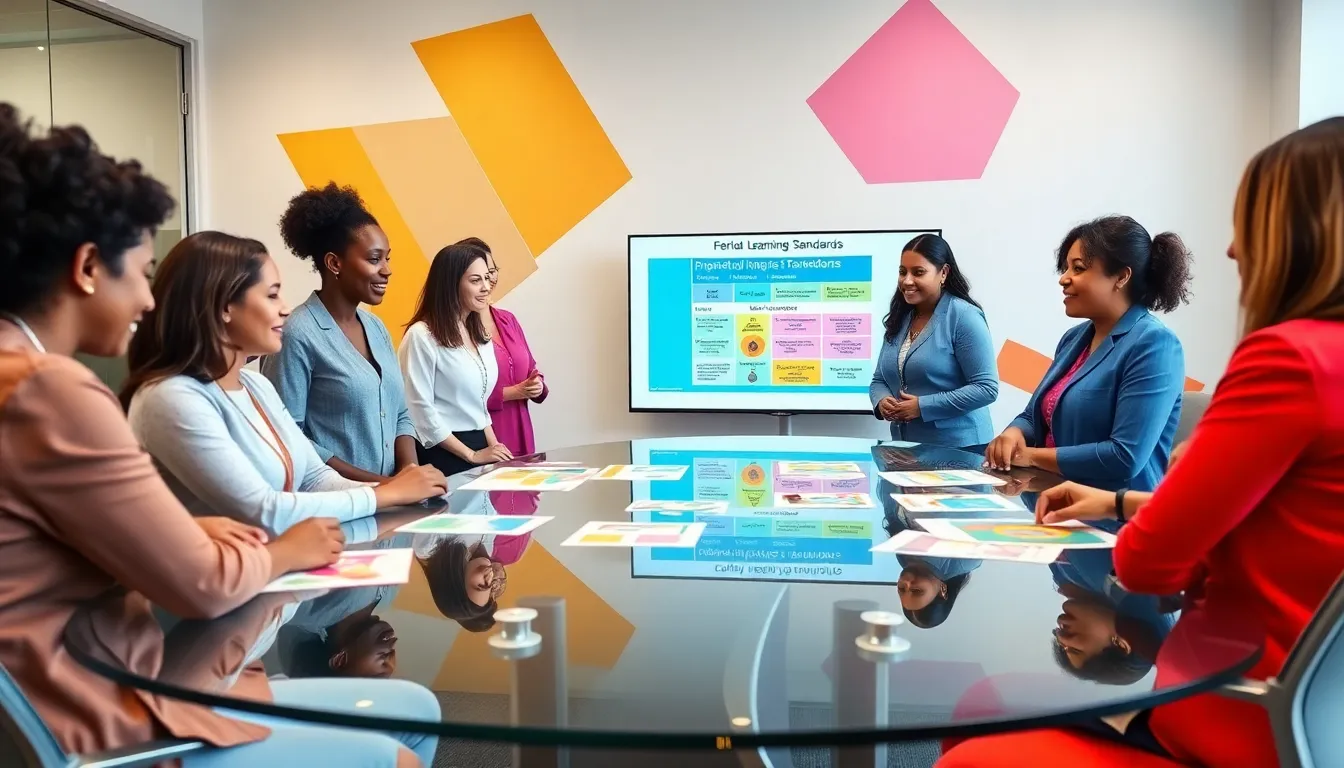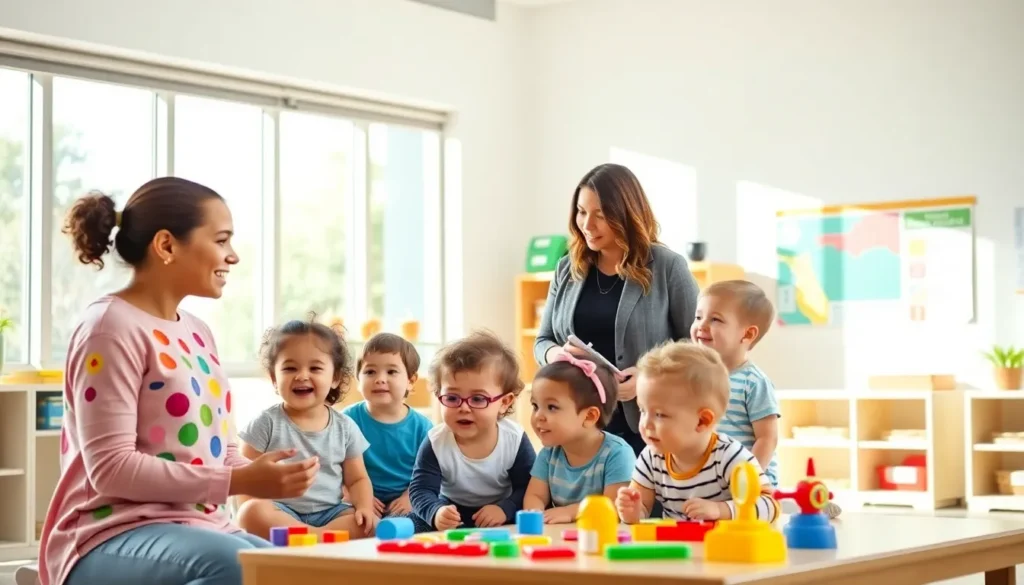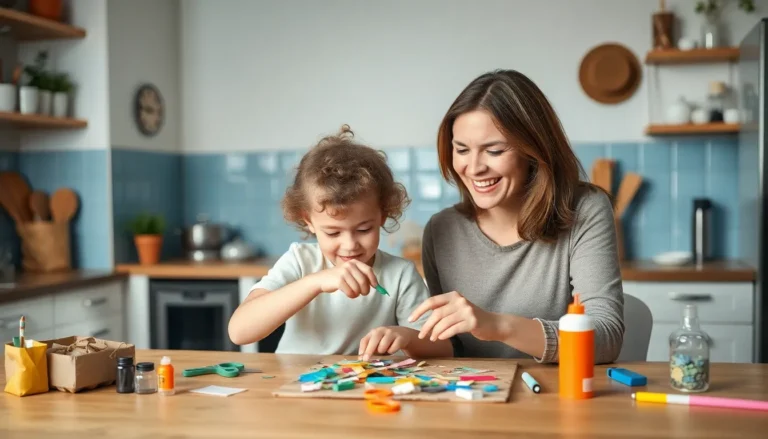In the sunny state of Florida, the early learning journey begins well before kindergarten. Florida Early Learning Standards lay the groundwork for what children need to thrive in those crucial formative years. But let’s face it, navigating these standards can feel like trying to find a beach umbrella on a windy day. Is it essential? Absolutely. This guide dives into what these standards entail, why they matter, and how they can help your little ones grow into their best selves. So, buckle up, and let’s embark on this enlightening adventure together.
Table of Contents
ToggleOverview of Florida Early Learning Standards

The Florida Early Learning Standards serve as a comprehensive blueprint for educators and caregivers, outlining essential developmental milestones. These standards are designed for children from birth to age five, providing a framework that enhances cognitive, social, emotional, and physical development. By focusing on various domains, the standards ensure children engage in a well-rounded education.
Established by the Florida Department of Education, these guidelines reflect current research and best practices in early childhood education. They offer benchmarks that educators can use to assess their curriculum and teaching methods effectively. Significantly, the standards promote consistent educational experiences across different learning environments, ensuring that all children receive high-quality instruction.
Purpose and Importance of Early Learning Standards
The purpose of the Florida Early Learning Standards cannot be overstated. They not only guide educators in creating effective lesson plans but also empower families to understand skill development in their children. Parents often feel overwhelmed when discussing early education, especially with so much information available. These standards simplify things, providing clear expectations about what children should learn at each stage of their early development.
Also, these standards emphasize the importance of social and emotional skills, which are vital for lifelong success. Children who develop strong foundational skills in these areas are likely to perform better academically later on. Simply put, by focusing on early learning, Florida is investing in a brighter future for its youth.
Key Components of the Standards
The Florida Early Learning Standards are divided into several key components, each focusing on different aspects of child development:
- Cognitive Development: Encourages critical thinking, problem-solving, and learning through exploration. It’s essential for children to feel confident as they navigate their learning environments.
- Language and Communication: Supports the development of verbal skills, comprehension, and literacy, allowing children to express themselves effectively.
- Social and Emotional Development: Focuses on interpersonal skills, emotional regulation, and self-concept. Happy kids are often those who are emotionally secure and know how to interact positively with their peers.
- Physical Development: Includes both gross and fine motor skills, as these are crucial for overall health and well-being. Encouraging physical activity lays the groundwork for a healthy lifestyle.
- Literacy and Math Readiness: Promotes early skills in reading and math, themed around curiosity and exploration. The world is full of opportunities to play with numbers and letters.
Implementation Strategies for Educators
Successful implementation of the Florida Early Learning Standards requires strategic planning and a nurturing approach. Educators should consider the following strategies:
- Professional Development: Ongoing training is essential for educators to stay updated on best practices and new research in early childhood education. Workshops and collaborative training provide valuable insights and support.
- Diverse Learning Environments: Use various settings to teach standards across various contexts, including indoor play, outdoor exploration, and group activities. Each environment provides unique learning opportunities.
- Family Engagement: Educators should involve families in the learning process. Workshops, newsletters, or simple discussions can keep parents informed and engaged, making them partners in their child’s education.
- Holistic Approach: Maintain a balance in focusing on all areas of development. Integrating cognitive, social, emotional, and physical activities ensures children receive a comprehensive learning experience.
Supporting Diverse Learners in Early Childhood Education
Supporting diverse learners is a critical aspect of early education. The Florida Early Learning Standards encourage inclusivity, addressing the unique needs of all children. Here are a few strategies:
- Culturally Relevant Curriculum: Incorporate diverse cultural perspectives and materials that reflect children’s backgrounds. This practice validates their experiences and fosters community among peers.
- Individualized Instruction: Tailor activities to meet different learning styles and paces. Some children may require more one-on-one interaction or visual aids to grasp concepts, while others thrive in group settings.
- Collaboration with Specialists: Engaging with special education professionals or development specialists can offer additional tools and resources to meet diverse needs effectively. Collaboration promotes growth and development for every child.
Assessment and Monitoring Progress
Monitoring progress is key to understanding how well children are meeting the Florida Early Learning Standards. Effective assessment strategies include:
- Ongoing Observations: Regularly observe children during activities and document their behaviors. These observations help identify developmental progress and areas needing focus.
- Portfolios: Collect samples of children’s work, such as drawings, writings, or projects. Portfolios create a tangible record of a child’s progress over time and can be shared with families.
- Parent Conferences: Regularly scheduled meetings with parents can help communication about their child’s growth and any concerns. Sharing assessments not only keeps parents informed but also strengthens the home-school connection.








